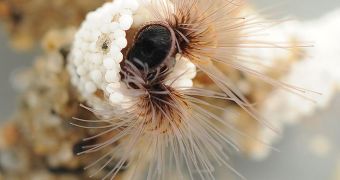A group of investigators from the Brigham and Women's Hospital, in Boston, announces the creation of a new type of surgical glue, a material capable of sealing broken hearts or blood vessels with efficiency.
The superglue was inspired by sandcastle worms, critters living on the coasts of California that spend their lives affixed to rocks in very humid environments, or even underwater. These worms live in colonies, and create their own sand and zirconium oxide tubes.
Scientists have been interested in replicating the glue various species such as the snail use to stay affixed to various surfaces for many years. These biological materials, a class that also includes spider silk, display interesting physical properties that could have significant applications in medicine.
By studying the sandcastle worm (Phragmatopoma californica), scientists led by cardiac surgeon Pedro del Nido were recently able to start work on an adhesive that is not only biodegradable, but also capable of sealing ruptures in arteries. The material has already been tested on pigs, the team says.
In a paper published in the January 8 issue of the scientific journal Science Translational Medicine, the Brigham research group says that the adhesive is strong enough to keep blood vessels sealed even under the high-pressure conditions in blood systems. The sealant is also capable to withstanding the pressure caused by human heart beats.
Del Nido and his team plan to use this glue to replace sutures and staples, commonly-used methods for sowing up wounds following surgeries. Sutures will not be removed from the equation altogether, since there are some types of operations to which they are indispensable.
However, when it comes to heart surgery, the new adhesive may do a better job overall at sealing arteries. “A glue is the holy grail for repairing hearts. Right now we use sutures,” the team leader says.
“Every time the needle and thread enter normal tissue, they do a little bit of damage. Usually it doesn't matter. But I repair children's hearts. For those, this damage can really be a problem,” he explains, quoted by NPR.
For heart surgeries, using regular skin glues is just not feasible. In addition to containing the potentially toxic chemical cyanoacrylate, these substances tend to harden when they come in contact with water. If this were to happen in the heart, or on a blood vessel, the consequences may be disastrous for patients.
The research group, which also included BWH bioengineer Jeffrey Karp, says that the adhesive has already completed a series of tests successfully. ”We made a hole in the heart of a living rat and showed that we can seal it up without removing the blood,” Karp explains.
“The animals were fine six months later,” he concludes, adding that human clinical trials are next.

 14 DAY TRIAL //
14 DAY TRIAL //